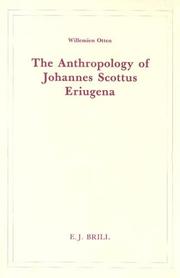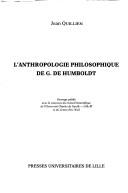| Listing 1 - 9 of 9 |
Sort by
|
Book
ISBN: 3631441568 9783631441565 Year: 1991 Publisher: Frankfurt am Main Lang
Abstract | Keywords | Export | Availability | Bookmark
 Loading...
Loading...Choose an application
- Reference Manager
- EndNote
- RefWorks (Direct export to RefWorks)
Philosophical anthropology. --- Philosophical anthropology --- Anthropology, Philosophical --- Man (Philosophy) --- Civilization --- Life --- Ontology --- Humanism --- Persons --- Philosophy of mind --- Philosophy

ISBN: 2711304515 9782711304516 Year: 1991 Publisher: S.l. Ed. universitaires
Abstract | Keywords | Export | Availability | Bookmark
 Loading...
Loading...Choose an application
- Reference Manager
- EndNote
- RefWorks (Direct export to RefWorks)
Philosophical anthropology --- History --- -Anthropology, Philosophical --- Man (Philosophy) --- Civilization --- Life --- Ontology --- Humanism --- Persons --- Philosophy of mind --- -Philosophy --- Blondel, Maurice --- -History --- -Blondel, Maurice --- Blondel, Maurizio --- Philosophical anthropology - History - 20th century.

ISBN: 2711304868 9782711304868 Year: 1991 Publisher: Paris Ed. universitaires
Abstract | Keywords | Export | Availability | Bookmark
 Loading...
Loading...Choose an application
- Reference Manager
- EndNote
- RefWorks (Direct export to RefWorks)
Philosophical anthropology --- Phenomenological anthropology --- History. --- -Phenomenology --- -Phenomenological anthropology --- -Anthropological phenomenology --- Anthropology --- Phenomenology --- Philosophy, Modern --- Anthropology, Philosophical --- Man (Philosophy) --- Civilization --- Life --- Ontology --- Humanism --- Persons --- Philosophy of mind --- History --- Philosophy --- Husserl, Edmund --- Ingarden, Roman --- Scheler, Max --- -History --- Husserl, Edmond --- Anthropological phenomenology --- Husserl, Edmund, --- Ingarden, Roman, --- Scheler, Max, --- Philosophical anthropology - History. --- Phenomenological anthropology - History.
Book
ISBN: 903619623X Year: 1991 Publisher: Tilburg Tilburg university press
Abstract | Keywords | Export | Availability | Bookmark
 Loading...
Loading...Choose an application
- Reference Manager
- EndNote
- RefWorks (Direct export to RefWorks)
Metaphysics --- Philosophical anthropology --- #GGSB: Antropologie --- #GGSB: Filosofie --- #GGSB: Metafysica --- 130.3 --- Philosophy --- God --- Ontology --- Philosophy of mind --- Anthropology, Philosophical --- Man (Philosophy) --- Civilization --- Life --- Humanism --- Persons --- 130.3 Metafysica van het geestesleven. Philosphy of mind. Artificial intelligence --- Metafysica van het geestesleven. Philosphy of mind. Artificial intelligence --- Antropologie --- Filosofie --- Metafysica
Book
ISBN: 0674713850 Year: 1991 Publisher: Cambridge, Mass. London Harvard University Press
Abstract | Keywords | Export | Availability | Bookmark
 Loading...
Loading...Choose an application
- Reference Manager
- EndNote
- RefWorks (Direct export to RefWorks)
Anthropologie philosophique --- Anthropology [Philosophical ] --- Antropologie [Filosofische ] --- Antropologie [Wijsgerige ] --- Connaissance [Théorie de la ] --- Epistemologie --- Epistemology --- Epistémologie --- Filosofie van de mensheid --- Filosofische antropologie --- Homme (Philosophie) --- Homme -- Philosophie --- Homme [Philosophie de l' ] --- Kenleer --- Kennisleer --- Kennistheorie --- Kentheorie --- Knowledge [Theory of ] --- Man (Philosophy) --- Mens (Filosofie) --- Menselijke natuur (Filosofie) --- Mind --- Nature humaine (Philosophie) --- Natuur [Menselijke ] (Filosofie) --- Ongeloof --- Philosophical anthropology --- Philosophie de l'homme --- Raison --- Rationaliteit --- Rationality --- Rationalité --- Reason --- Rede --- Scepticism --- Scepticisme --- Skepticism --- Theorie of knowledge --- Theorievorming --- Théorie de la connaissance --- Unbelief --- Wijsgerige antropologie --- Knowledge, Theory of --- Agnosticism --- Belief and doubt --- Free thought --- Intellect --- Rationalism --- Anthropology, Philosophical --- Civilization --- Life --- Ontology --- Humanism --- Persons --- Philosophy of mind --- Theory of knowledge --- Philosophy --- Psychology --- Hume, David --- ヒューム --- Knowledge, Theory of. --- Reason. --- Skepticism. --- Philosophical anthropology. --- Hume, David,
Book
ISBN: 3772813658 9783772813658 Year: 1991 Volume: 24 Publisher: Stuttgard : Frommann-Holzboog,
Abstract | Keywords | Export | Availability | Bookmark
 Loading...
Loading...Choose an application
- Reference Manager
- EndNote
- RefWorks (Direct export to RefWorks)
Psychology --- Philosophical anthropology --- History --- -Philosophical anthropology --- -Anthropology, Philosophical --- Man (Philosophy) --- Civilization --- Life --- Ontology --- Humanism --- Persons --- Philosophy of mind --- Behavioral sciences --- Mental philosophy --- Mind --- Science, Mental --- Human biology --- Philosophy --- Soul --- Mental health --- -Congresses --- Hegel, Georg Wilhelm Friedrich --- -Contributions in psychology --- -History --- -Hegel, Giorgio Guglielmo Frederico --- Contributions in psychology --- Hegel, Georg Wilhelm Friedrich, --- Anthropology, Philosophical --- Hegel, Giorgio Guglielmo Frederico --- Hēgeru, --- Hei-ko-erh, --- Gegelʹ, Georg, --- Hījil, --- Khegel, --- Hegel, G. W. F. --- Hegel, --- Hei Ge Er, --- Chenkel, --- Hīghil, --- הגל, --- הגל, גאורג וילהלם פרידריך, --- הגל, גיאורג וילהלם פרידריך, --- הגל, ג.ו.פ, --- היגל, גורג ווילהלם פרדריך, --- היגל, גיורג וילהלם פרידריך, --- 黑格尔, --- Hegel, Guillermo Federico, --- Hegel, Jorge Guillermo Federico, --- Heyel, Georg Wilhelm Friedrich, --- Higil, Gʼūrg Vīlhim Frīdrīsh, --- هگل, --- هگل، گئورگ ويلهم فريدريش, --- Psychology - History - 19th century - Congresses. --- Philosophical anthropology - History - 19th century - Congresses.

ISSN: 09208607 ISBN: 9004093028 9789004093027 900424669X 9789004246690 Year: 1991 Volume: 20 Publisher: Leiden : E.J. Brill,
Abstract | Keywords | Export | Availability | Bookmark
 Loading...
Loading...Choose an application
- Reference Manager
- EndNote
- RefWorks (Direct export to RefWorks)
This book deals with Eriugena's anthropology in the general context of his thinking on universal nature. At the outset the role of man seems to be conditioned by nature's dynamic development through the Neoplatonic stages of procession and return. As man is located at the turning- point between procession and return, he is not only governed by nature's unfolding, but can also exercise control over it. Thus it is shown that man should be seen as much more independent than the cosmological structure of Eriugena's philosophy of nature seems to indicate. The study of Eriugena's anthropology urges a re-evaluation of the position of man in the early medieval period. Although man characteristically possesses a sinful, created state, Eriugena shows that this does not prevent him from entertaining a free and direct relationship with God and the surrounding universe. In dealing with the problem of human sin, Eriugena brings out Christ's saving role, but it seems counterbalanced by man's intrinsic potential as the 'divine image' to rehabilitate himself. In this respect Eriugena's flexible method of reasoning - his handling of negative theology, theophany and allegorical exegesis - serves as a remarkable example of human independence in what has so often been portrayed as the 'static' early-medieval world.
Philosophical anthropology --- Philosophy of nature --- Philosophy, Medieval --- Anthropologie philosophique --- Philosophie de la nature --- Philosophie médiévale --- Erigena, Johannes Scotus, --- Erigena, Johannes Scotus --- -Contributions in philosophical anthropology --- #GROL:SEMI-1-05'08' Joan --- Medieval philosophy --- Scholasticism --- Nature --- Nature, Philosophy of --- Natural theology --- Anthropology, Philosophical --- Man (Philosophy) --- Civilization --- Life --- Ontology --- Humanism --- Persons --- Philosophy of mind --- Philosophy --- Philosophie médiévale --- Philosophical anthropology. --- Philosophy of nature. --- Philosophy, Medieval. --- Erigena, Johannes Scotus, - ca. 810-ca. 877 --- Erigena, Johannes Scotus - - Contributions in philosophical anthropology --- -Erigena, Johannes Scotus --- -Philosophical anthropology

ISBN: 9782859393946 2859393943 Year: 1991 Publisher: Lille Presses universitaires de Lille
Abstract | Keywords | Export | Availability | Bookmark
 Loading...
Loading...Choose an application
- Reference Manager
- EndNote
- RefWorks (Direct export to RefWorks)
Philosophical anthropology --- Anthropologie philosophique --- History. --- Histoire --- Humboldt, Wilhelm, --- -Anthropology, Philosophical --- Man (Philosophy) --- Civilization --- Life --- Ontology --- Humanism --- Persons --- Philosophy of mind --- History --- Philosophy --- Humboldt, Wilhelm Freiherr von --- -History --- Humboldt, Wilhelm von, --- Humboldt, Guillaume, --- Humboldt, Charles Guillaume, --- Humboldt, Friedrich Wilhelm Christian Karl Ferdinand, --- Humboldt, Guillermo de, --- De Humboldt, Guillermo, --- Von Humboldt, Wilhelm, --- De Humboldt, Guillaume, --- De Humboldt, Charles Guillaume, --- Von Humboldt, Friedrich Wilhelm Christian Karl Ferdinand, --- Von Humboldt, Guillermo, --- Humbolts, V., --- Humboldt, G. de --- Gumbolʹdt, V., --- Gumbolʹdt, Vilʹgelʹm fon, --- Humboldt, Wilhelm von --- Philosophical anthropology - History.

ISBN: 2711610799 9782711610792 Year: 1991 Volume: 46 Publisher: Paris : Librairie J. Vrin,
Abstract | Keywords | Export | Availability | Bookmark
 Loading...
Loading...Choose an application
- Reference Manager
- EndNote
- RefWorks (Direct export to RefWorks)
Philosophical anthropology --- Philosophy --- Philosophy, Medieval --- Thirteenth century --- Mind and body --- Intellect --- Anthropologie philosophique --- Philosophie --- Philosophie médiévale --- Treizième siècle --- Esprit et corps --- Intelligence --- History --- Histoire --- Philosophy, Medieval. --- History. --- "">1 "12" <44 PARIS> --- -Philosophy --- -Philosophy, Medieval --- Medieval philosophy --- Scholasticism --- Mental philosophy --- Humanities --- Anthropology, Philosophical --- Man (Philosophy) --- Civilization --- Life --- Ontology --- Humanism --- Persons --- Philosophy of mind --- Filosofie. Psychologie--?"12"--Frankrijk--PARIS --- Filosofie. Psychologie--?"12"--Frankrijk--PARIS"">1 "12" <44 PARIS> Filosofie. Psychologie--?"12"--Frankrijk--PARIS --- Philosophie médiévale --- Treizième siècle --- Philosophical anthropology - History. --- Philosophy - France - Paris - History. --- HISTOIRE INTELLECTUELLE --- PHILOSOPHIE MEDIEVALE --- PHILOSOPHIE ET RELIGION --- 13E SIECLE
| Listing 1 - 9 of 9 |
Sort by
|

 Search
Search Feedback
Feedback About
About Help
Help News
News